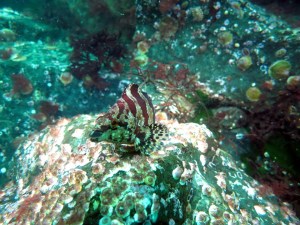
Sea urchins may not seem like they’re destined for great things in life, but the marine environment would really by quite different without them.
These prickly creatures, which are related to sea stars, spend most of their time eating. Eating for them involves scraping rocky surfaces of algae and other life forms with 5 rather vicious looking teeth. Though they are typically characterized as “grazers” (eating primarily algae), former Sebens labbie, Robin Elahi, and others have noted that they eat pretty much anything small and sessile (attached) that’s unlucky enough to be in their path.
Many researchers have noted the importance of sea urchins in maintaining invertebrate-rich marine ecosystems. By consuming leafy algal species such as kelps, which can dominate rocky surfaces, urchins may facilitate a higher diversity of invertebrate species that would otherwise be out-competed.

Such a shift in community composition at the proverbial hands of urchins has been documented in other, less urban ecosystems. However, we’ve found that Seattle’s rocky, subtidal ecosystem is dominated by a different suite of algal players. Red leafy algae tend to be much more successful in Seattle than the brown kelps that are dominant at rural, higher flow sites in the region.
We’ve conducted a survey of the invertebrate and algal community in Seattle, and it appears that urchins may be reducing red algal abundance at sites where they’re present in moderate numbers. In the presence of urchins, we find organisms like serpulid worms, jingle shell clams, and coralline algae. We think this may be because urchins are clearing space for these species to settle. Without urchins, red macroalgae appears to take over and leave little room for the more delicate characters you see here.
This findings, however, are observational. Until we test the hypothesis presented here, there will be no way of knowing whether urban urchins truly are destined for big things in life. More to come on that front!